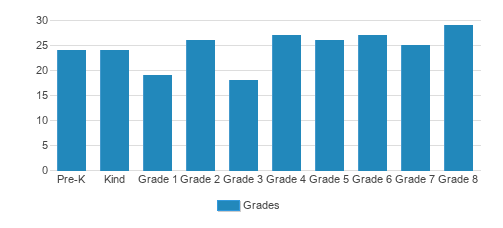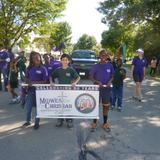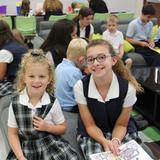St. Dominic School is a Catholic Christian education community and an active part of the local Churches, St. Dominic and St. Francis, and the Diocese of Joliet.
It provides its students with an integration of quality education and experiences in Christian worship and living through a functional curriculum which addresses all aspects of a person's growth and development in a technological society.
Students are encouraged and challenged to develop their spiritual, academic, emotional, social and physical potentials.
A natural outgrowth of this development is that students become viable, active witnesses to Jesus by hearing the Word in worship, proclaiming the Word in action, actively participating in the community parish lives of St. Dominic and St. Francis parishes, and committing to Christian service.
With the active involvement of parents, who are the primary educators, we arrive to achieve our distinctive purpose: to create a school community where human culture and knowledge, enlivened by faith is shared in a family atmosphere among parents, priests, teachers, students and the parish family faith communities and organizations in a spirit of freedom and love.
School Overview
Religious Affiliation
Grades Offered
Grades Prekindergarten-8
Student Body
Total Students
194 students
Student Body Type
Co-ed
% Students of Color
71%
State avg.: 34%
Students by Grade

Academics and Faculty
Total Classroom Teachers
12 teachers
Student : Teacher Ratio
16:1
National avg.: 13:1
Tuition and Acceptance Rate
Admission Deadline
None / Rolling
School Notes
- St. Dominic School is a Catholic Christian education community and an active part of the local Churches, St. Dominic and St. Francis, and the Diocese of Joliet. It provides its students with an integration of quality education and experiences in Christian worship and living through a functional curriculum which addresses all aspects of a person's growth and development in a technological society. Students are encouraged and challenged to develop their spiritual, academic, emotional, social and physical potentials. A natural outgrowth of this development is that students become viable, active witnesses to Jesus by hearing the Word in worship, proclaiming the Word in action, actively participating in the community parish lives of St. Dominic and St. Francis parishes, and committing to Christian service. With the active involvement of parents, who are the primary educators, we arrive to achieve our distinctive purpose: to create a school community where human culture and knowledge, enlivened by faith is shared in a family atmosphere among parents, priests, teachers, students and the parish family faith communities and organizations in a spirit of freedom and love.
Source: National Center for Education Statistics (NCES)
Frequently Asked Questions
When is the application deadline for St. Dominic Elementary School?
The application deadline for St. Dominic Elementary School is rolling (applications are reviewed as they are received year-round).
Recent Articles

A Parent's Guide To Understanding High School Teaching Methods
This comprehensive guide helps parents navigate the various teaching methods used in today's high school classrooms. By understanding these approaches, you'll be better equipped to support your teen's learning journey, communicate effectively with teachers, and create a complementary learning environment at home.

February 08, 2025
Social Emotional Learning: Education's Hidden SymphonyA musician's perspective on Social Emotional Learning reveals how this educational framework orchestrates success through five essential emotional competencies.

January 24, 2025
A Roadmap For Starting A Private SchoolUse this roadmap as a set of talking points with your trusted mentors and professionals to start the private school of your dreams. You're not alone. Over the years, hundreds of folks like you have had the same dream. From Quintilian to Maria Montessori to Lucy Madeira Wing, visionary educators have established schools to teach according to their beliefs and methodologies.
















